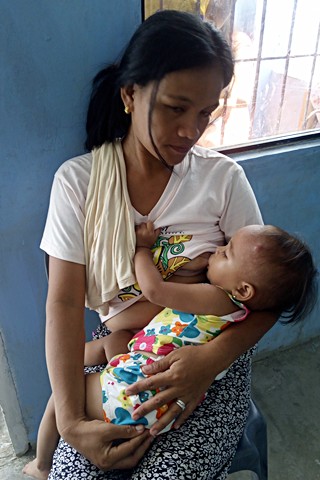Save the Children
Philippines to mothers: Breastfeed infants exclusively on first 6
months
Press Release
August 6, 2019
MAKATI CITY – Save
the Children Philippines is urging mothers to breastfeed infants
exclusively during the first six months to protect them from
diseases such as diarrhea and pneumonia – the world’s leading causes
of child death.
 The group raised concern
on the steady decline of exclusive breastfeeding in the Philippines
with 65 to 68.6 per cent of mothers breastfeeding exclusively for
the first two months but declining to 29 percent as babies turn 5
months. The figure was reflected in the 2018 Expanded National
Nutrition Survey of the Department of Science and Technology - Food
and Nutrition Research Institute.
The group raised concern
on the steady decline of exclusive breastfeeding in the Philippines
with 65 to 68.6 per cent of mothers breastfeeding exclusively for
the first two months but declining to 29 percent as babies turn 5
months. The figure was reflected in the 2018 Expanded National
Nutrition Survey of the Department of Science and Technology - Food
and Nutrition Research Institute.
The call was made in time
for the World Breastfeeding Week, celebrated from August 1 to 7 with
the theme: “Empower Parents. Enable Breastfeeding” to raise
awareness on the many benefits of breastfeeding.
Despite known benefits of
breastmilk, 60 per cent of the world’s total infants including those
in the Philippines are not getting the recommended six months of
exclusive breastfeeding.
Lawyer Albert Muyot, Chief
Executive Officer of Save the Children Philippines said existing
laws including the Milk Code and First 1,000 Days mandate local
governments and hospitals to facilitate exclusive breastfeeding for
newborn babies up to six months.
He said local health and
nutrition workers have a critical role to allow the infant to be
breastfed in the first hour after birth and assist mothers to
breastfeed exclusively in the first six months and to continue up to
two years with complementary feeding.
“Local leaders should
invest in health and nutrition of children by hiring adequate number
of skilled health and nutrition workers to ensure mothers breastfeed
immediately after birth and exclusively up to six months,” said
Muyot.
In a research study of
Save the Children Philippines, it cited the decline in breastfeeding
practice due to the lack of skilled health workers in maternity
clinics in the communities.
The study also noted
rampant violations of the Philippine Milk Code or Executive Order
51, National Code of Marketing Breast Milk Supplements and Other
Products that prohibits the promotion of milk products as breastmilk
substitutes.
It also blamed aggressive
promotions of giant manufacturers of breastmilk substitutes or milk
formula targeting mothers and putting health claims in the packaging
that misinform the public that the benefits of breastmilk can be
gained from infant formula.
The study noted that there
are still milk companies that sponsor trips and conventions of
doctors and health workers to encourage them to promote milk
products to mothers of infants and young children.
Save the Children
Philippines implements a Maternal, Newborn and Child Health and
Nutrition program in the most deprived communities in Caloocan,
Navotas and Malabon in Metro Manila as well as in the provinces of
Sarangani and North Cotabato conflict-affected areas in Mindanao.
Dr. Amado Parawan, Health
and Nutrition Advisor of Save the Children Philippines said besides
exclusive breastfeeding for six months, mothers should ensure
continuous breastfeeding up to two years to guarantee optimum health
of their babies.
Save the Children
Philippines advocated the passage of the Republic Act No. 11148 or
Kalusugan at Nutrisyon ng Mag-Nanay Act that ensures optimum care of
a child from conception up to two years or the first 1,000 days of
life to reduce malnutrition and child deaths due to preventable
causes.
The law, now passed as
ordinance in the cities of Malabon, Caloocan and Navotas, and the
municipalities of Magpet and Arakan in North Cotabato and Alabel in
Sarangani mandates exclusive breastfeeding for babies during the
first six months.
More than 30 studies
worldwide have shown that breastfeeding provides optimum benefits to
both mothers and babies that include:
• Reduces the risk of
dying for infants and young children. At least 840,000 neonatal
deaths can be prevented annually if breastfeeding is initiated
within an hour after birth.
• Boost immune system for
infants and young children living in areas with poor sanitation and
unsafe drinking water.
• Reduce cases of
respiratory tract infections, gastrointestinal infections, urinary
tract infections and otitis media among babies and children.
• Reduce rates of Sudden
Infant Death Syndrome within the first year of life.
• Decrease incidence of
both insulin-dependent and non-insulin-dependent diabetes mellitus
among children
• Reduce possibility of
lymphoma, leukemia, and Hodgkin’s disease, obesity, and allergic
conditions in children.
• Reduce risks of mothers
getting breast cancer, ovarian cancer and type 2 diabetes.